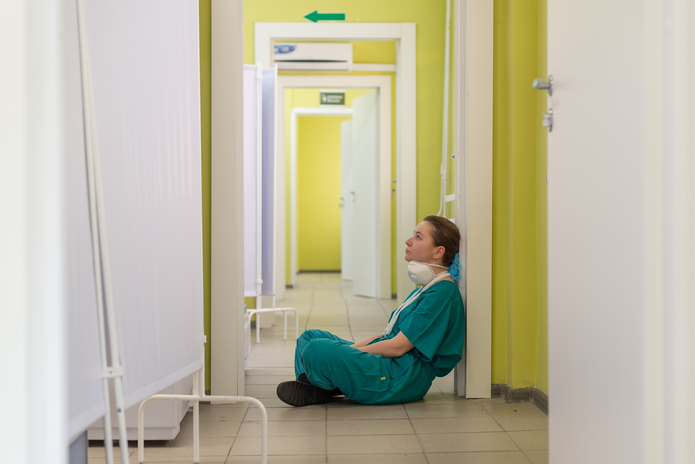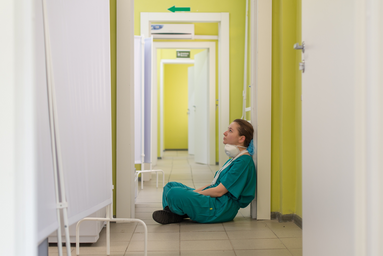In the last week of 2020, I got my first dose of the Pfizer vaccine against COVID-19. I had been working on the nursing team in a skilled nursing facility for much of 2020. As with many facilities, our restrictions ebbed and flowed based on our exposure and risk. It is a complete blessing to say that none of our residents were infected with the virus, only staff members, and even that number stayed under 10. Even so, our community outside the facility walls battled high infection rates, ICU stays, and deaths. I contribute our incredibly low rates to very strict regulations. In March, our community shut down to all visitors except those whose loved ones were receiving end-of-life care (i.e. hospice). Residents living independently on campus whose spouses and partners lived with more support in our health center could not visit in-person. If any resident spent time in the hospital, they were subjected to a 14 day stay in isolation, interacting only with PPE clad nursing staff. Staff members were screened every time we came to campus and were restricted from travelling and multi-household gatherings. We wore masks and face shields and were tested for the virus once a week. If we received any positive results from these tests, restrictions tightened. Staff would not move from unit to unit, nursing donned N95 respirators which had to be worn five times despite the manufacturer’s single-use recommendation. All this is to illustrate the war we waged against the virus. A war we ultimately won. December 28th, the day we received our vaccinations, felt like a victory. A weight lifted. A new day and quite literally a new year.

Both COVID-19 vaccines on the market work because of mRNA injected into our upper arms.[1] The mRNA does not contain live COVID-19 virus, but instead provides instructions for our immune system to make a harmless protein referred to as a “spike protein.” Once our cell mimics this spike protein, it destroys the instructions and displays the protein on the cell surface. The immune system recognizes the spike protein as foreign and begins building an immune response and antibodies. This response allows your body to practice what would happen if it was exposed to a natural COVID-19 infection. The Pfizer vaccine is taken in two doses, 21 days apart, and is recommended for folks 16 years and older. [2] The Moderna vaccine is also two doses, but they are taken 28 days apart, recommended for adults age 18 and older. [3]
I received the Pfizer vaccine. The first dose was easy. I had no side effects except a little soreness in my arm. This soreness was like any shot and went away in a few days. The second dose I received on January 18th. The actual poke hurt decidedly less than dose one, which I have no explanation for except that different people administered the vaccine, since the two doses are exactly the same. I worked the evening shift without issue. With that being said, at the 12 hour mark I woke up not feeling very well. Similar to a mild case of the flu, I experienced some chills and nausea, with a low-grade fever (99.6° F) and headache. I took some ibuprofen, drank some water, added some blankets to my bed, and tried to get back to sleep. I won’t lie, that next day wasn’t fun. I spent much of the day lying low and catching up on some Netflix. While many of the side effects went away after 24 hours, my headache persisted for a few days. Water and Advil kept it at bay fairly easily. Two weeks after my second shot, I was considered fully vaccinated, with antibodies to protect me. [4] Here’s a photo of me at work, feeling good and hopeful.

Every day, I am thankful for the hard work of scientists and every person in between who made it possible for me to receive my vaccine. Even though I am fully vaccinated, I still abide by all COVID protocols. I still wear a mask everywhere I go, limit my gatherings, and get tested weekly at work. It is essential I keep practicing social distancing and mask wearing after getting my vaccine. These actions will allow our communities to remain safe and protected, as the vaccine becomes available to more people.
If you as a reader take anything from my experience it is this: get vaccinated when it’s your turn. Even though I experienced side effects and didn’t feel great after my second dose, I would do it again in a heartbeat. My symptoms reminded me that my body was building antibodies and that there was hope. This vaccine is hope for millions of Americans whose lives have been turned upside down and changed forever by this virus. Americans who have lost loved ones, jobs, housing. This vaccine is what you can do to move forward to a better, safer world. That, and social distancing, which you better be doing!

[2] Centers for Disease Control and Prevention. (January, 2021) Information on the Pfizer-BioNTech COVID-19 vaccine. Retrieved from https://www.cdc.gov/coronavirus/2019-ncov/vaccines/different-vaccines/Pf…
[3] Centers for Disease Control and Prevention. (January, 2021) Information on the Moderna COVID-19 vaccine. Retrieved from https://www.cdc.gov/coronavirus/2019-ncov/vaccines/different-vaccines/Mo…
[4] Centers for Disease Control and Prevention. (February, 2021) What to expect after getting a COVID-19 vaccine. Retrieved from https://www.cdc.gov/coronavirus/2019-ncov/vaccines/expect/after.html



